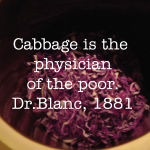 Sauerkraut is fermented and pickled cabbage that is quite popular as a condiment to hot dogs, sausage, corn beef, and other meat dishes. Sauerkraut is made by a process of pickling called lacto-fermentation and if properly made and air-sealed does not require refrigeration until once opened. The German method of making sauerkraut uses Juniper berries.
Sauerkraut is fermented and pickled cabbage that is quite popular as a condiment to hot dogs, sausage, corn beef, and other meat dishes. Sauerkraut is made by a process of pickling called lacto-fermentation and if properly made and air-sealed does not require refrigeration until once opened. The German method of making sauerkraut uses Juniper berries.
There are many great health benefits to eating fermented foods. Some of the awesome benefits of sauerkraut include:
1. Immune Booster – The naturally occurring phytochemical by-products of sauerkraut help boost the immune system which leads to a decrease in a number of health problems. The common cold, skin problems, and even weight gain are all aided by a healthy functioning immune system.
2. Cancer Fighter – The results of a study published in the Journal of Agricultural and Food Chemistry concluded that the fermentation of cabbage produced a substance called isothiocynates, which prevents cancer growth, particularly in the breast, colon, lung, and liver. A recent study by the American Center for Cancer Research found that the lack of consuming sauerkraut, a traditional part of the Polish diet has a profound effect among Polish women in the United States who have much higher breast cancer rates due to the “Americanizing” of their diets. This dietary change was especially significant while they were in still in adolescence.
 3. Digestive Aid – Sauerkraut is one of the few foods that contain the bacterium Lactobacilli plantarum. L. planatarum is a very dominant strain of healthful bacteria which helps your digestive system in the following ways: boost the immune system by increasing antibodies that fight infectious disease help inhibit pathogenic organisms including E.coli, salmonella, and unhealthy overgrowth of candida (yeast). It also creates antioxidants (glutathione and superoxide dismutase) that scavenge free radicals which are a cancer precursor. Sauerkraut transforms hard-to-digest lactose from milk to the more easily digested lactic acid. It neutralizes the antinutrients found in many foods including the phytic acid found in all grains.
3. Digestive Aid – Sauerkraut is one of the few foods that contain the bacterium Lactobacilli plantarum. L. planatarum is a very dominant strain of healthful bacteria which helps your digestive system in the following ways: boost the immune system by increasing antibodies that fight infectious disease help inhibit pathogenic organisms including E.coli, salmonella, and unhealthy overgrowth of candida (yeast). It also creates antioxidants (glutathione and superoxide dismutase) that scavenge free radicals which are a cancer precursor. Sauerkraut transforms hard-to-digest lactose from milk to the more easily digested lactic acid. It neutralizes the antinutrients found in many foods including the phytic acid found in all grains.
4. Constipation reliever – A long standing folk remedy to keep the intestines clean and regular leading to an overall feeling of well-being. The fermentation process increases the nutrient value of cabbage, particularly the vitamin C levels. It also assists the breakdown and assimilation of proteins.
Interested in making your own sauerkraut? Alton Brown has an easy recipe that we love.
Try substituting sauerkraut as a side for any protein based meal particularly pork.
Try adding it to your regular grilled cheese sandwich. Try it in the morning alongside scrambled eggs with a piece of your favourite grain bread.
 Heart disease is the number one killer in the US and in the top along with stroke and cancer in Canada. February highlights the work of various foundations and charities who work relentlessly to educate, assist and prevent these epic numbers in our populations.
Heart disease is the number one killer in the US and in the top along with stroke and cancer in Canada. February highlights the work of various foundations and charities who work relentlessly to educate, assist and prevent these epic numbers in our populations.



